Embark on a journey with “Green Superfood: The Ultimate Guide to Moringa Leaf Powder” and explore how this natural wonder can elevate your health, beauty, and vitality.
Table of Contents
Introduction
Moringa Oleifera, commonly known as Moringa, is not just another trendy superfood. Its rich history and remarkable nutritional profile have cemented its place as a staple in traditional medicine and daily diets across the globe. But what makes Moringa leaf powder a must-have in your wellness toolkit? Let’s find out.
Green Superfood: The Ultimate Guide to Moringa Leaf Powder
Origins and History
Moringa has been revered for centuries in various cultures for its medicinal properties and nutritional value. Originating from the foothills of the Himalayas, it has spread across the tropics, becoming a symbol of resilience and life.
Nutritional Profile
Moringa Oleifera, more commonly known as Moringa, is a plant that has been praised for its health benefits for thousands of years. It is native to the Indian subcontinent but has spread throughout tropical and subtropical regions around the world. Moringa is often referred to as the “drumstick tree,” “miracle tree,” or “tree of life” due to its multipurpose leaves, pods, and seeds that can be utilized for their nutritional and medicinal properties.
The history of Moringa dates back to ancient civilizations. It has been used in Ayurvedic medicine for over 4,000 years, where it was believed to cure and prevent over 300 diseases. The Romans, Greeks, and Egyptians extracted edible oil from its seeds and used it for perfume and skin lotion. In traditional African and Asian diets, Moringa leaves have been a significant source of nutrition. During times of famine or food scarcity, Moringa has been a critical source of essential nutrients.
The tree’s ability to grow in harsh climates, with minimal water, has made it a key crop for combating malnutrition and promoting sustainability in developing countries. Its rapid growth and drought-resistant qualities allow for easy cultivation and accessibility to those who need it most. The Moringa tree’s deep roots can also help prevent soil erosion, further contributing to its environmental benefits.
In recent years, the popularity of Moringa has surged in the West due to its impressive nutritional profile. It is rich in vitamins A, C, and E, calcium, potassium, and protein, among other nutrients. The global health and wellness community has embraced Moringa as a superfood, incorporating it into diets through powder, capsules, and teas.
Moringa’s origins and history are a testament to its resilience and versatility. From ancient medicinal uses to modern-day superfood status, Moringa continues to offer a wide range of health benefits to people around the world. Its continued research and application in nutrition, medicine, and sustainability projects highlight Moringa’s potential in addressing global health and environmental challenges.
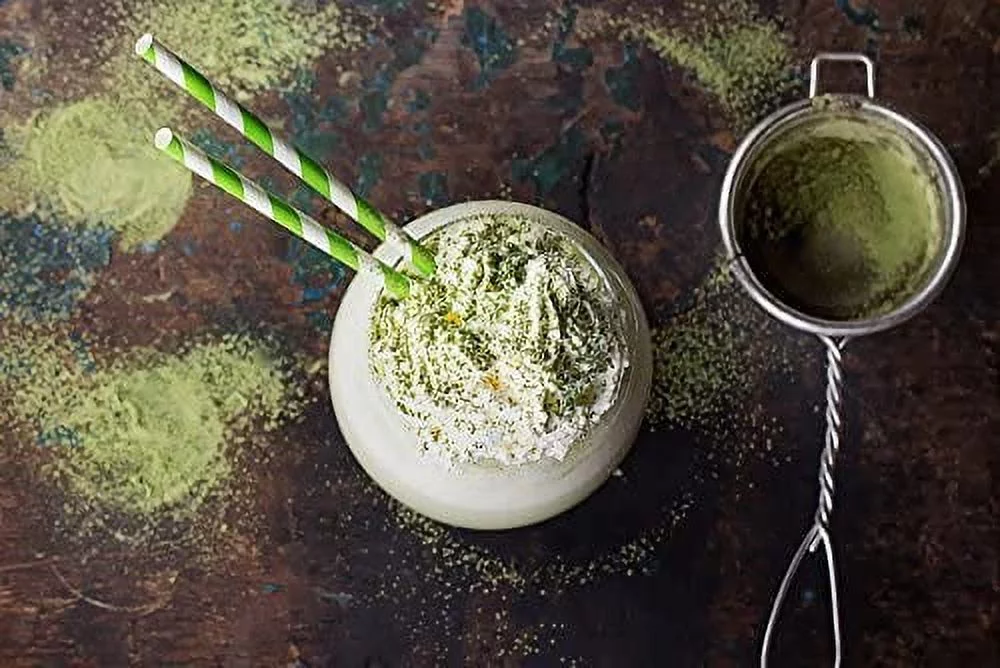
Health Benefits
Boosting Immune System
Moringa is packed with vitamins A, C, and E, which are crucial for maintaining a robust immune system. Vitamin C stimulates the production of white blood cells, vital for combating infections and diseases, while vitamin A ensures the integrity of our skin and mucous membranes, the body’s first line of defense. Vitamin E acts as a powerful antioxidant, protecting the body’s cells from damage caused by free radicals.
Energy Levels and Metabolism
Feeling sluggish? Moringa can help revitalize your energy levels without the crash associated with caffeine. Thanks to its rich iron content, which is essential for the formation of hemoglobin that transports oxygen in the blood, and its high levels of vitamin B, particularly B12, Moringa helps improve energy production and reduce fatigue. Additionally, Moringa supports metabolism, aiding in digestion and the conversion of food into energy due to its B vitamins.
Skin and Hair Health
Moringa’s benefits extend beyond just internal health; it’s a boon for your skin and hair too. Its high antioxidant content combats aging by neutralizing free radicals, leading to healthier, more radiant skin. Vitamins A and E, along with zinc, promote skin repair, moisture retention, and protect against UV damage, making your skin look younger and more vibrant. For hair, Moringa’s rich zinc content helps with keratin production, resulting in stronger, healthier hair growth.
Anti-inflammatory and Antioxidant Effects
Chronic inflammation can lead to numerous health issues, including heart disease, diabetes, and cancer. Moringa contains various anti-inflammatory compounds, such as isothiocyanates, which have been shown to significantly reduce inflammation. Furthermore, its antioxidant properties help lower oxidative stress in the body, reducing the risk of chronic diseases and promoting overall health.
Improving Digestive Health
The fiber content in Moringa aids in promoting a healthy digestive system by preventing constipation and supporting a healthy gut flora. Moringa also has been found to have a mild laxative effect, helping to keep the digestive system running smoothly.
Supporting Bone Health
Rich in calcium and phosphorus, Moringa helps strengthen bones and prevent osteoporosis. These minerals are essential for healthy bone formation and maintenance, making Moringa an excellent supplement for people at risk of bone degenerative diseases, especially postmenopausal women.
Cardiovascular Health
Moringa’s potent combination of antioxidants, anti-inflammatory compounds, and nutrients helps in maintaining a healthy heart. It aids in reducing cholesterol levels, controlling blood pressure, and preventing plaque formation in the arteries, thereby reducing the risk of heart disease.
Blood Sugar Regulation
Moringa has been shown to have a stabilizing effect on blood sugar levels, making it beneficial for diabetics or those at risk of diabetes. Its high antioxidant content can help reduce oxidative stress and improve blood glucose control, contributing to overall metabolic health.
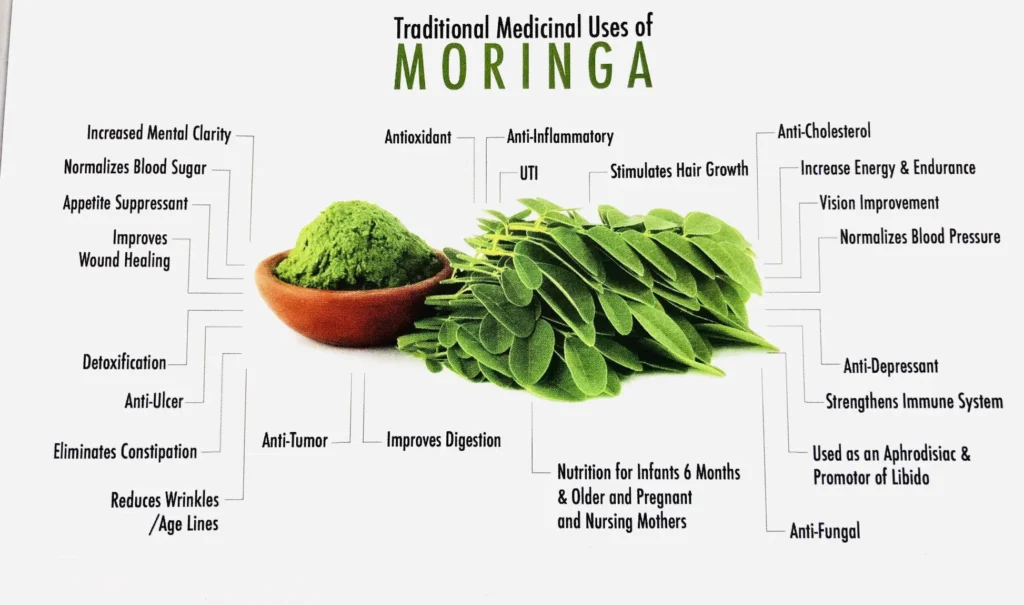
Incorporating Moringa into Your Diet
Adding Moringa leaf powder to your diet is a simple yet effective way to boost your nutritional intake and enjoy its myriad health benefits. Its versatility allows it to be easily incorporated into a variety of dishes, from smoothies to soups. Here are some practical tips and ideas for making Moringa a regular part of your daily routine.
Start with Smoothies
One of the easiest and most popular ways to consume Moringa is by blending it into smoothies. Its mild, earthy flavor pairs well with fruits and vegetables, making it a nutritious addition that won’t overpower the taste of your favorite smoothie recipes. Try adding a teaspoon of Moringa powder to a blend of banana, spinach, and almond milk for a refreshing and healthful drink.
Sprinkle Over Meals
Moringa powder can be sprinkled over salads, soups, and stews, adding a nutrient boost without significantly altering the taste of your meals. Its fine texture and mild flavor make it a versatile condiment that can enhance the nutritional value of almost any dish.
Bake with It
Incorporate Moringa powder into your baking by adding it to bread, muffins, and pancake mixes. It not only adds nutrients but also gives your baked goods a vibrant green hue. Because of its mild flavor, Moringa won’t disrupt the taste of your favorite recipes. Start with a small amount, about one to two teaspoons, to ensure it complements the flavors of your baked items.
Tea and Beverages
Moringa can be brewed into a soothing tea. Simply add a teaspoon of Moringa powder to hot water and let it steep for a few minutes. You can also mix Moringa powder into other beverages, such as juices or milk, for an extra nutritional kick.
Creative Cooking
Experiment with Moringa by incorporating it into your cooking. It can be mixed into pasta sauces, sprinkled on pizza, or even added to omelets. The key is to start with a small amount and adjust according to your taste preferences.
Dosage and Safety Considerations
While Moringa is generally safe for most people, it’s important to consider the appropriate dosage. Typically, starting with one teaspoon of Moringa powder per day is recommended, gradually increasing to two or three teaspoons, depending on your tolerance and nutritional needs.
It’s also crucial to choose high-quality, organic Moringa powder to avoid consuming contaminants or additives. Pregnant and breastfeeding women should consult with a healthcare provider before adding Moringa to their diet, as it contains compounds that may not be suitable for them.
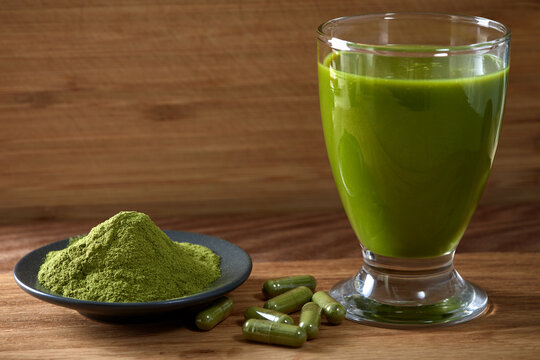
Comparison with Other Superfoods
Moringa vs. Spirulina
Spirulina, a type of blue-green algae, is celebrated for its high protein content and antioxidants. While both Moringa and Spirulina are excellent sources of nutrients, Moringa offers a broader range of vitamins and minerals. Moringa contains higher levels of vitamin C, calcium, and potassium, making it superior for immune support, bone health, and blood pressure regulation. Spirulina, however, may have a higher protein concentration, which is beneficial for muscle growth and repair.
Moringa vs. Wheatgrass
Wheatgrass is another popular superfood, known for its detoxifying properties and high chlorophyll content. Compared to Wheatgrass, Moringa has a more comprehensive nutrient profile, including a greater variety of vitamins, minerals, and antioxidants. Moringa’s higher iron content makes it particularly beneficial for preventing anemia, and its calcium levels support bone health. Wheatgrass may be preferred for its cleansing properties, but Moringa offers broader nutritional benefits.
Moringa vs. Chlorella
Chlorella, like Spirulina, is a type of algae with a high concentration of chlorophyll. It’s often used for detoxification, especially for heavy metals. While Chlorella is effective for detoxification, Moringa provides a wider range of nutrients, including significant amounts of vitamins A, C, and E, which are essential for immune function, skin health, and protection against oxidative stress. Moringa also contains various antioxidants not found in Chlorella, making it a more comprehensive choice for overall health.
Unique Advantages of Moringa
What sets Moringa apart from other superfoods is its incredibly rich nutrient profile. It contains over 90 nutrients and 46 types of antioxidants, making it one of the most nutrient-dense foods on the planet. Moringa’s versatility in cooking and its mild taste also make it more accessible and easier to incorporate into daily diets compared to other superfoods, which may have stronger, more acquired tastes.

User Testimonials and Expert Opinions
User Testimonials
Many users report significant improvements in their energy levels, skin clarity, and overall health after adding Moringa to their daily routines. For instance, Jane, a 34-year-old from California, shares, “I started adding Moringa powder to my morning smoothies about six months ago. Not only have I noticed an increase in my energy levels throughout the day, but my skin has never looked better. It’s become a non-negotiable part of my wellness routine.”
Similarly, Mike, a 45-year-old marathon runner from New York, credits Moringa with enhancing his athletic performance and recovery. “Since I began incorporating Moringa into my diet, I’ve seen a noticeable improvement in my endurance and muscle recovery after long runs. It’s a natural boost that I can feel good about.”
These firsthand experiences highlight the versatile benefits of Moringa, from enhancing beauty and energy to supporting physical activity and recovery.
Expert Opinions
Nutritionists and health professionals are also recognizing Moringa’s superfood status. Dr. Sarah Williams, a nutritionist with over 20 years of experience, states, “Moringa is a nutrient powerhouse that can contribute significantly to a balanced diet. Its high levels of vitamins, minerals, and antioxidants make it an excellent choice for anyone looking to boost their immune system, improve skin health, and increase their intake of plant-based protein.”
Furthermore, Dr. Mark Anderson, a researcher in plant-based nutrition, emphasizes Moringa’s role in preventive health care. “The anti-inflammatory and antioxidant properties of Moringa make it a valuable tool in preventing chronic diseases. Its diverse nutrient profile supports various aspects of health, from cardiovascular to bone health.”
Clinical Studies and Research
The endorsements of Moringa extend beyond anecdotal evidence, with several clinical studies and research papers supporting its health benefits. For example, a study published in the Journal of Food Science and Technology highlighted Moringa’s potential in lowering blood sugar levels, making it beneficial for people with diabetes. Another research in the Journal of Ethnopharmacology focused on Moringa’s anti-inflammatory properties, suggesting its usefulness in managing conditions like arthritis.
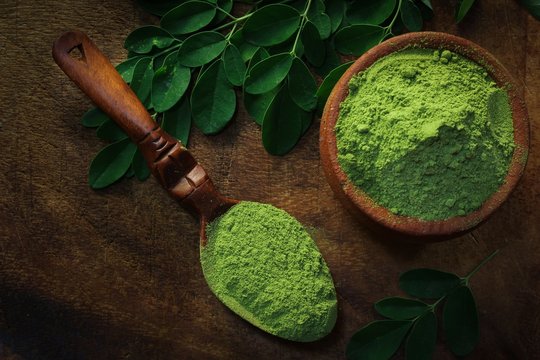
How to Store and Preserve
Choose the Right Container
Store Moringa leaf powder in an airtight container to protect it from moisture and air, which can degrade its quality over time. Glass jars with tight-sealing lids are ideal as they do not transfer any odors or chemicals to the powder. If using plastic containers, ensure they are food grade and BPA-free to avoid any potential contamination.
Keep It Cool and Dry
Exposure to heat and moisture can lead to the degradation of nutrients in Moringa powder and promote the growth of mold or bacteria. Store the container in a cool, dry place away from direct sunlight, such as a pantry or cupboard. Avoid placing it near stoves, ovens, or windows where it can be exposed to heat and light.
Avoid Contamination
Use a clean, dry spoon each time you scoop out Moringa powder to prevent introducing moisture into the container. Moisture can create clumps and make the powder less pleasant to use. Keeping the powder dry ensures that it remains free-flowing and easy to incorporate into your dishes and drinks.
Consider Refrigeration for Long-term Storage
For long-term storage or in warmer climates, refrigerating Moringa powder can help preserve its freshness and potency. When stored in the refrigerator, make sure the container is airtight to prevent the powder from absorbing odors from other foods. Moringa powder can also be frozen to extend its shelf life further, although this is generally not necessary if it will be consumed within a few months.
Check for Freshness
Regularly check your Moringa powder for signs of spoilage, such as changes in color, smell, or the presence of mold. Fresh Moringa powder should have a vibrant green color and a mild, earthy smell. If the powder appears dull or has an off odor, it’s best to discard it and replace it with a fresh batch.
Use Within the Recommended Timeframe
While properly stored Moringa powder can last for several months, it’s best used within six months to a year for optimal nutritional benefits. Over time, even when stored correctly, the nutrient levels in Moringa powder can gradually decrease.
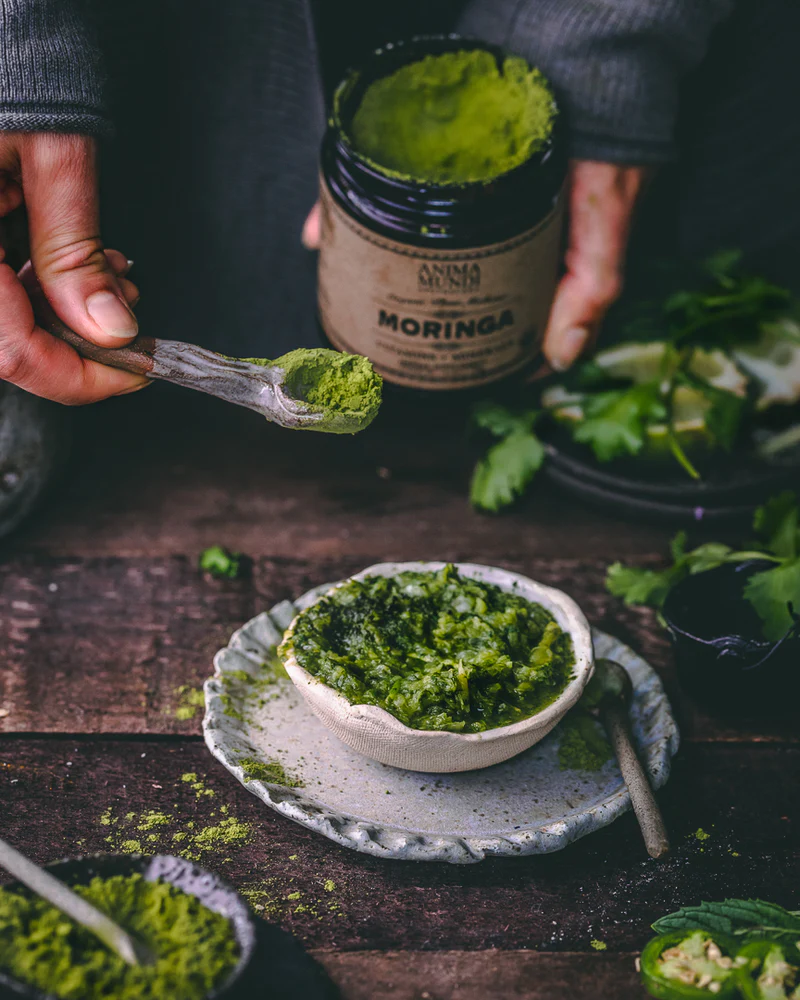
Potential Side Effects and Interactions
Digestive Issues
Some people may experience digestive discomfort when consuming Moringa leaf powder, especially in large quantities. This can include symptoms like gas, bloating, or diarrhea. These side effects are typically due to the high fiber content of Moringa, which, while beneficial for digestive health, can cause issues for individuals not accustomed to high-fiber diets. Starting with a small dosage and gradually increasing it can help your body adjust.
Lower Blood Pressure and Blood Sugar Levels
Moringa has been shown to lower blood pressure and blood sugar levels, which is beneficial for many individuals. However, for those already taking medications for hypertension or diabetes, Moringa could potentially enhance the effects of these drugs, leading to hypotension or hypoglycemia. If you’re on medication for these conditions, consult with a healthcare professional before adding Moringa to your diet.
Interactions with Medications
Moringa can interact with certain medications, including those for diabetes and high blood pressure, as well as medications processed by the liver. Moringa may affect how quickly the liver breaks down these medications, impacting their effectiveness. Always discuss with your healthcare provider before starting any new supplement if you are taking prescription medications.
Pregnancy and Breastfeeding
Although Moringa is a nutritious supplement, there is limited research on its safety during pregnancy and breastfeeding. Certain parts of the Moringa plant, such as the root, bark, and flowers, contain compounds that might contract the uterus. While the leaf powder is commonly used and considered safer, pregnant and breastfeeding women should err on the side of caution and consult a healthcare professional before using Moringa.
Allergic Reactions
While rare, allergic reactions to Moringa have been reported. Individuals with known allergies to other plants in the Moringaceae family should be cautious when trying Moringa for the first time. Signs of an allergic reaction may include rash, itching, or difficulty breathing, and require immediate medical attention.
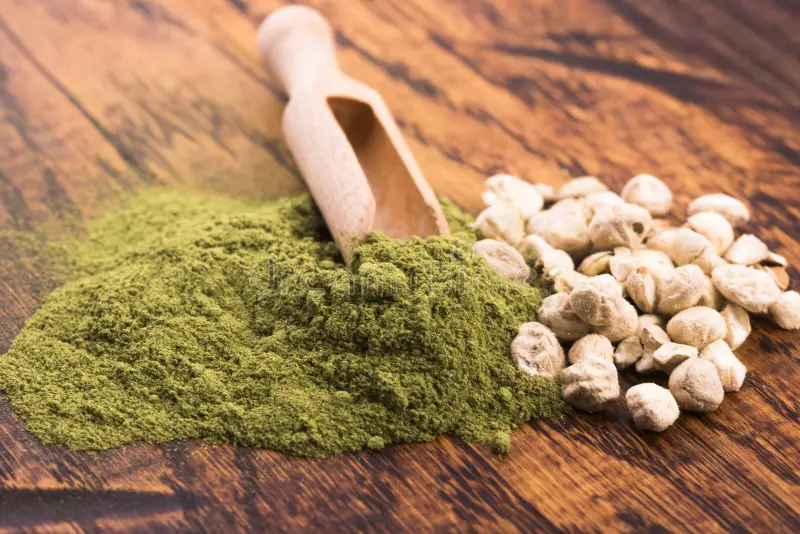
Moringa for Beauty Products
Moringa in Skincare
Moringa is increasingly featured in skincare products due to its nourishing and protective properties. Here’s how it benefits the skin:
- Antioxidant Protection: Moringa is packed with antioxidants like vitamins A, C, and E, which help combat the signs of aging by neutralizing free radicals that can damage skin cells. This leads to a reduction in wrinkles, fine lines, and improved skin vitality.
- Hydration: The high vitamin E content in Moringa provides moisturizing benefits, making it a great ingredient in creams and lotions designed to hydrate and soothe dry, flaky skin.
- Clear Complexion: Moringa has natural antibacterial properties that help fight acne-causing bacteria, promoting a clearer complexion. Its ability to purify and detoxify the skin also aids in reducing the appearance of dark spots and blemishes.
- Skin Repair: Rich in vitamin A, Moringa supports the growth and repair of skin cells. Its application through beauty products can enhance skin renewal, leading to fresher, youthful-looking skin.

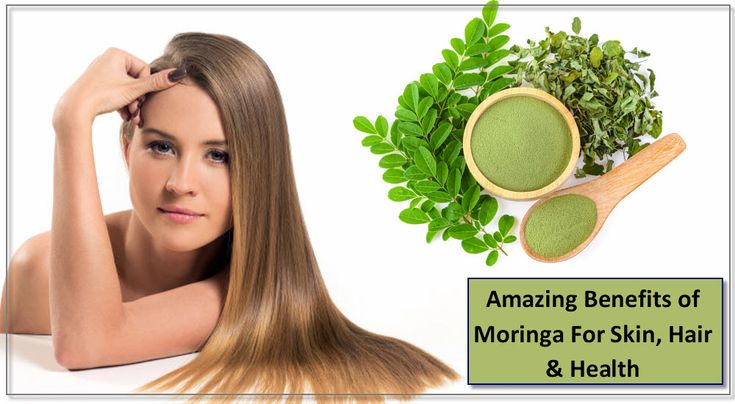
Moringa in Haircare Products
The benefits of Moringa extend to haircare, where it’s valued for its ability to nourish and strengthen hair:
- Scalp Health: Moringa’s anti-inflammatory and antiseptic properties can soothe the scalp, reducing dandruff and irritation. This creates a healthy environment for hair growth.
- Strengthening Hair: The plethora of vitamins, minerals, and amino acids in Moringa serve to strengthen hair strands, minimize breakage, and prevent hair loss. Products like Moringa-infused shampoos and conditioners can significantly improve hair’s texture and strength.
- Moisturizing: For those with dry, brittle hair, Moringa oil and hair products can offer deep moisturization, thanks to its oleic acid content. This helps in retaining moisture and keeping hair soft and shiny.
- Promotes Growth: Moringa is rich in zinc, which is essential for healthy hair growth. Incorporating Moringa into hair products can stimulate growth and help in achieving fuller, thicker hair.
DIY Beauty Treatments with Moringa
Beyond commercial products, Moringa can be used at home to create simple yet effective beauty treatments:
- Face Mask: Mix Moringa powder with honey and lemon juice for a revitalizing face mask that brightens and hydrates the skin.
- Hair Mask: Combine Moringa powder with coconut oil and apply it to the hair and scalp for deep conditioning. This mask can strengthen hair roots and promote a healthy scalp.
Conclusion
Moringa leaf powder is more than just a supplement; it’s a lifestyle. Its unparalleled nutritional value and versatility make it an essential component of a balanced diet and a healthy, vibrant life. As we continue to uncover the full potential of this green superfood, one thing is clear: Moringa is here to stay, enriching our bodies and our planet.




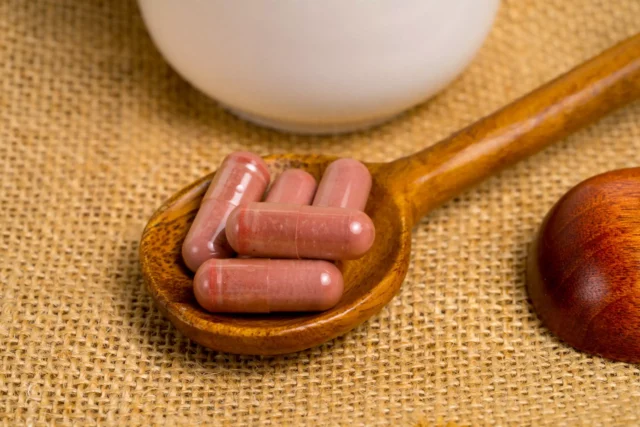




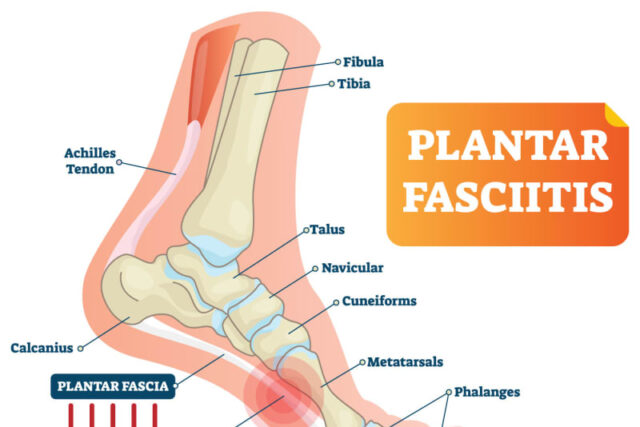



Hiya! I simply want to give a huge thumbs up for the great information you will have right here on this post. I shall be coming again to your blog for more soon.